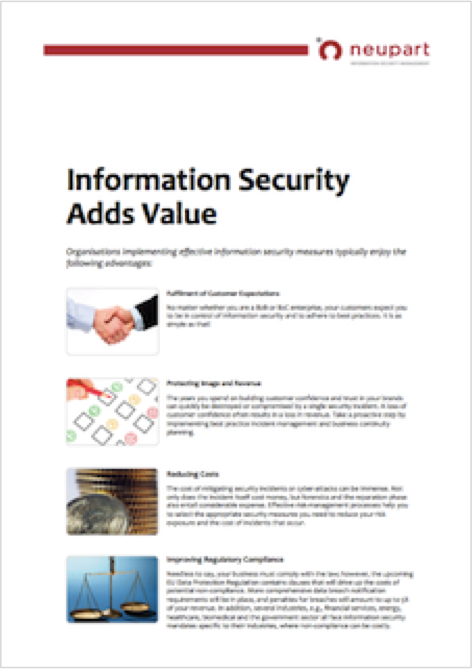Our most recent blog post dealt with The three golden rules of a business continuity plan. This time, we continue in the world of business continuity planning and take a closer look at scenarios and strategies.
Choosing the right business continuity scenarios for your BCP
[fa icon="calendar'] Wednesday, 08 June 2022 / by Jakob Holm Hansen under business continuity strategy, Business Continuity Planning, Information Security Management, business continuity scenario, ISMS, BCP, disaster recovery
The three golden rules of a business continuity plan
[fa icon="calendar'] Monday, 30 May 2022 / by Jakob Holm Hansen under Business Continuity Planning, Information Security Management, IT risk assessment, information security policies, SecureAware BCP, ISMS, BCP
"How long should a business continuity plan be?" This is a question we often hear from our customers. My answer usually is: "As short as possible!" The truth is that the perfect business continuity plan (if such a thing exists) should be three - sometimes contradictory - things at once:
Do you need to explain what ISO 27001 is?
[fa icon="calendar'] Tuesday, 06 April 2021 / by NorthGRC under ISO 27001, Information Security Management, Information risk management, ISMS
We've produced this video to help you communicate the main components of an Information Security Management System (ISMS), as described in ISO 27001. You may need this information when talking to your company's management team, and getting onboard in securing your business.
Watch the video explaining what ISMS and ISO27001 are.
These four facts about ISO 27001 and an ISMS are vital in your work as someone who deals with information security, risks, or IT in general. Understanding the fundamentals and getting started the right way is the biggest step of them all.
The four facts about ISO27001 are:
- ISO27001 is an international standard about how to manage your information security
- You must know your risks!
- You need an Information Security Policy
- It is a process, not a project!
We are experts in information security (ISO 27001/-2) and GDPR, and our ISMS is an intuitive cloud-based platform where you can handle everything you need in regards to both ISO27001/-2 and GDPR.
Get deeper into information security, GDPR, and our ISMS either by browsing our knowledge base or visiting the main ISMS page here.
ISMS: The value you can measure is the value you deliver
[fa icon="calendar'] Monday, 12 November 2018 / by Jakob Holm Hansen under ISO 27001, ISMS, annual information security plan
ISMS performance monitoring allows security officers to document specific business values while also enhancing the level of security within the organisation. A white paper provides inspiration on how to select, define, and monitor effects in an ISMS solution.
How to make compliance interesting. A guide to awareness campaigns
[fa icon="calendar'] Tuesday, 09 June 2015 / by Jakob Holm Hansen under compliance, Best practice, Information Security Management, ISMS, Awareness, GRC
Once you have read my article, you will have a good idea of how to approach your compliance awareness campaign. You will get concrete advice on choosing topics, forming alliances, and how to measure how well your campaign worked.
Compliance is hardly known for being the world's most interesting topic. In the eyes of many, it is time-consuming, limiting, and boring.
A run-down car can get purple fringe tail lights, 30-inch fins, and a Palomino dashboard - and become Greased Lightnin'. Similarly, you can give compliance a makeover in order to make the topic more accessible, relevant, and exciting.
This is what you do:
- Get the support of the management
- Choose the right topics
- Meet people where they are
The support of management
You must first and foremost ensure the involvement of the management. There are two reasons for this:
For one thing, the employees should hear from the management why compliance is important. The message then carries more weight.
For another thing, awareness campaigns are not free. They cost the organization time. You will only get the resources you need if you make it clear to the management as to why you need a compliance awareness campaign. If a compliance audit has resulted in findings and recommendations or if you need to follow ISO 27001/2, NIS2, or any other standards, you will have a compelling argument. Awareness is a requirement set out in ISO 27001 and ISO 27002, so there is no way around this. A focus on compliance can furthermore save you time and money. Both your finances and your image take a hit when a user error causes a data leak or system breakdown.
Moreover, awareness is about communication. If this is not your strong side, you should become good friends with your communications or marketing department, if you have those in the company. They will be able to help you to reach out to the employees in a language they understand.
Choose the right topics
With the backing of your new allies, you should now figure out the areas on which your awareness campaign should focus. There are many topics from which to choose, some heavier than others, and unnecessary information needs to be removed.
Consider the problems you have experienced based on the ignorance of users. A few examples may be:
- Guests to the company are not registered when they arrive and they walk around without access cards.
- Documents with confidential information are lying around in an unlocked room.
- Sensitive personal information is not sent through secure email (encrypted).
If you are unsure of anything, get hold of HelpDesk or IT support if you have those functions. They can tell you what employees most often ask about and what they are unsure of. You can also consider whether you recently began to use new systems or carry out tasks in a new manner. Have the employees become familiar with this or are there many mistakes?
You will possibly find more problems than you can address in a single awareness campaign. Focus on the most important parts and save the less important ones until your next campaign. We must make sure to use simple and powerful messages. Prepare short campaigns with simple themes, and then run campaigns more often.
Meet people where they are
Now you need to go out and meet people where they are. The employees sit in front of their computers, they eat in the cafeteria and they go to Friday morning meetings. This is where you should meet them. One way to do this is by means of:
- Happenings - Little funny things that get people talking. This can involve small figures or other such things placed on the employees’ table, or by handing out chocolate bars in exchange for them agreeing never to share their passwords with anybody. The possibilities are limited only by your imagination and it does not even have to be especially expensive.
- Messages with good advice - E-mails that briefly describe a problem area and how the employee should act.
- Postings on the intranet - Again: make them short and useful. Once the posting is read, the employee shall know precisely what he should (or should not) do and why it is important.
- Posters in the cafeteria - The posters make employees aware of the campaign and get the employees (hopefully) to talk about why compliance is important.
- Morning meetings - If everyone is assembled for a weekly morning or Friday meeting, you can try to squeeze in a little speech of your own.
- Quizzes - A quiz has the benefit of involving the participants. Put up some wine or chocolate as a prize to the employee or department that does the best.
An employee awareness quiz can also show management that your awareness campaign has had an effect on people. Set a realistic goal for yourself. If half of all the employees take the quiz, you have done a great job! A quiz also shows you the areas in which you need to do more to train the employees.
So, can you make compliance interesting? You can at least come a long way when you make it accessible, relevant, and engaging.
There are many programs that can help you make quizzes. Our compliance platform for all Governance, Risk, and Compliance matters not only makes it possible for you to write your own questions and answers but also follows up on how many have been answered correctly. You also get an entire library of questions/answers concerning compliance from which you can pick. This way you efficiently ensure that the employees are made familiar with the relevant policies and rules, as well as any compliance with standards, such as ISO 27001.
Contact us for a demo of our compliance platform
About the Author: Lone Forland is our product expert and offers instruction in awareness campaigns, among other topics. Lone Forland furthermore helps our customers get started with our GRC tool and serves as a liaison between customers and development.
Why should managers be interested in information security?
[fa icon="calendar'] Wednesday, 25 February 2015 / by Jakob Holm Hansen under business continuity, compliance, it security audit, Information Security, ISO 27001, Best practice, Information Security Management, security requirements, ISMS, cyber attack, Risk Management
You should be involved in security since security means something to your customers and because cyber attacks and security incidents are beginning to occur within all kinds of businesses. We have all seen the numerous examples of data breaches, attacks and other security incidents in the news. Often, one might expect or hope the involved organisations were better protected then they actually were. Information security is very much on the agenda, both in the business world and in the media.
Your customers, regardless of whether you sell directly to customers or to other businesses, are presently interested in the topic. That is why you as a manager and a senior executive should take an interest in whether your organisation is sufficiently prepared for a major cyber attack or a systems crash. That should be as good an argument as any! However, there are even more good reasons that I would like to share with you.
Brand image and profitability: Perhaps you have spent years slowly but surely building credibility for your brand name(s). You want your customer to have confidence in you. One security incident can quickly serve to reduce the trust and confidence you have gained to such a degree that even the best (or most expensive) image campaign will not be able to bring it back.
Fees: Add to this the enormous costs to you when you need to deal with a major security breach. Such costs are incurred both due to the incident itself and the following investigation, cleanup and restoration. Theft of company secrets and/or intellectual property rights, as well as industrial espionage can obviously be expensive and even a threat to the very existence of some companies. Afterward, it will surely be shown that more investment in preventive security measures would have made good sense and would have saved money. Moreover, since the threat will continue to develop, it would be a good investment for the future as well.
Legal Statutes: You are subject to certain legal requirements demanding that you have a sufficient level of information security. Bear in mind present and future Personal Data Acts. The future EU personal data legislation (an ordinance) is expected to passed so that it will apply in all EU Member States. It provides for companies to pay fines of perhaps as much as 5% of their turnover for computer security breaches. There is a comprehensive requirement that the parties be notified (data breach notification), which is both expensive and difficult to perform. Add to this a number of industry-specific requirements: for example, that financial enterprises must comply with financial supervisory authorities' requirements concerning information security, requirements placed on the energy sector, the health sector and for state-run enterprises to comply with the ISO 27001 standard.
Governance Requirements: Corporate governance requirements determine 1) that management set out the procedures necessary for risk management and internal inspections, 2) that the administration take a position on strategic and commercial risks and 3) that managers who negligently has caused the company to suffer damages shall pay compensation for such damages. In other words, there is also an array of legislative reasons to be interested in information security.
Review: You likely also strive for your review to be consistent with most of everything that might be found in those long review guidelines. Your information security will also be reviewed. Keep in mind as well, that regardless of the fact that accounting firms play a dubious double role (at the same time offering a wide range of both executive and advisory consultancy services within the field of information security), it pays for you to prepare for the review proactively. It should be easy for you to document that you are in control of your information security.
However, what should you as an executive do, in addition to taking an interest in the topic? Easy: You should A) communicate to your organisation that security is important, that it is a basic condition for your business activities and b) you should investigate whether you have allocated sufficient financial and human capital in your organisation to deal with the everyday, practical management of your information security.
If you want to get a little bit deeper into the subject, I recommend you examine your maturity level in these areas:
-
Policies, rules, procedures and documentation
-
Risk management (risk assessment and continual risk treatment)
-
Incident management and contingency plans
Proper governance and management of information security has become a common best practice simply because it has become a necessary condition for most commercial activities. That is why a manager should be interested in information security.
PS: Click here to follow us on LinkedIn
Has ‘Plan-Do-Check-Act´disappeared in the new ISO 27001?
[fa icon="calendar'] Friday, 04 April 2014 / by Jakob Holm Hansen under ISO 27001:2013, ISO 27001, Information Security Management, Information risk management, overview information security management, Compliance and task management, plan-do-check-act, ISMS, ISO Standards
The Plan-Do-Check-Act (PDCA) process originates from quality assurance in production environments, but has for some years also been a requirement in the ISMS standard ISO 27001 (ISMS = Information Security Management System).
Three ways the ISO 27001 revision will affect your company
[fa icon="calendar'] Monday, 15 April 2013 / by Jakob Holm Hansen under ISO 27001, KPI, ISMS, ISO 27001 revision, ISO 27005, ISO 31000
It has been eight years since the ISO 27001 standard was last revised but now changes are coming.


.jpg)



